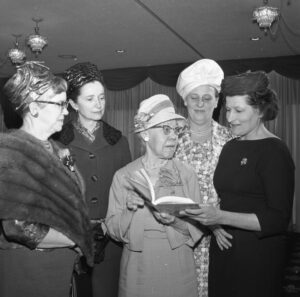Late in 1998, a few women who had been active in the Women’s Movement of the 1960s and 70s began discussing their influence on the London community. They realized that unless an effort was made to preserve the stories and records of their activism, a part of London’s history would be lost. By 2000, an expanded group met regularly as The London Women’s History Project (LWHP). The group set a goal to ensure that the stories and records of the Second Wave Women’s Movement were preserved for future generations as a rich and valuable part of London’s heritage. In 2001, the group organized its first public meeting downtown to inform Londoners of their search for records, stories, and artifacts from individuals and groups who contributed to women’s history from 1960 to 1980. Many materials were collected as part of the project, including 25 tapes of interviews with London women in 1979, personal records, memorabilia, and the meeting minutes from several women’s groups.
In 2002, the group approached the board charged with the creation of a new public library downtown to see if the materials being collected could be housed there, perhaps in a new Women’s Room or in the existing London Room. When the idea was rejected, the group approached the University of Western Ontario Archives with a request to establish a London Women’s History Collection. Receiving a positive and enthusiastic response, a relationship between the LWHP and UWO was established. From this, the LWHP Collection was born.
 By the end of 2010, the records of many London women and groups had entered the archives at UWO. In addition, the existing 1979 tapes were transcribed, and 54 new oral history tapes and transcripts had been made by students in the “Oral Histories, Women’s Histories” course at UWO under the leadership of Professor Rebecca Coulter. The course was created in response to a request from the LWHG to the Dean of Women’s Studies.
By the end of 2010, the records of many London women and groups had entered the archives at UWO. In addition, the existing 1979 tapes were transcribed, and 54 new oral history tapes and transcripts had been made by students in the “Oral Histories, Women’s Histories” course at UWO under the leadership of Professor Rebecca Coulter. The course was created in response to a request from the LWHG to the Dean of Women’s Studies.
To ensure ongoing involvement and contact with the community, LWHP began a tradition of holding an annual meeting on International Women’s Day (March 8) to update the community on the project. Further, the LWHP website was launched in 2009. it describes the project and further invites all interested persons to provide biographies of women they know who contributed to women’s activism from 1965 to 2000.